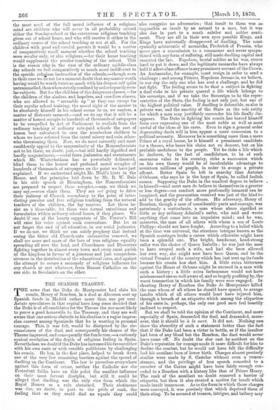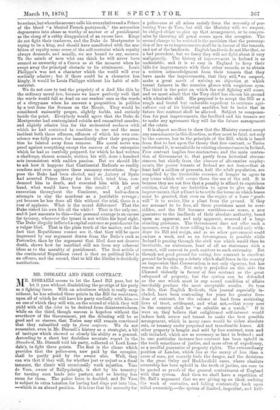THE SPANISH TRAGEDY. T HE news that the Duke de Montpensier
had slain his cousin, Henry of Bourbon, in a duel at Alcorcon sent up Spanish funds in Madrid rather more than one per cent. Astute speculators in that capital have long since decided that the Duke is of all candidates for the Throne the one most likely to prove a good housewife to the Treasury, and they are well aware that one serious obstacle to his election is a vague impres- sion current among Spaniards that he is wanting in personal courage. This, it was felt, would be dissipated by the cir- cumstances of the duel, and consequently his chance of the Throne improved, and consequently the funds rose,—a curiously cynical revelation of the depth of religious feeling in Spain. Nevertheless, we doubt if the Duke has in creased his favour either with his own caste or with sensible politicians by challenging his cousin. He has, in the first place, helped to break down one of the very few remaining barriers against the spread of duelling on the Continent. The law is powerless everywhere against this form of crime, neither the Catholic nor the Protestant faiths have on this point the smallest influence on their most fervent disciples, but still it could be alleged that duelling was the only vice from which the Royal Houses as a rule abstained. Their abstinence was due, no doubt, in part to the pride of rank, the feeling that as they could find no equals they could also recognize no adversaries ; that insult to them was a& impossible as insult by an animal to a man, but it was also due in part to a much subtler and nobler senti- ment. They are all in their own eyes possible Kings, and Kings have universally disapproved of duelling. The most cynically aristocratic of monarchs, Frederick of Prussia, who. never gave a commission to a commoner and never sympa- thized with any form of suffering, still made duelling capital and executed the law. Napoleon, brutal soldier as he was, strove hard to put it down, and the legitimate monarchs have always held it afirst-class offence in any prominent servant of the Crown.. An Ambassador, for example, must resign in order to send a, challenge ; and among Princes, Napoleon Jerome is, we believe, in our day the only one who has sent a challenge, and he did not fight. The feeling seems to be that a subject in fighting a duel risks in his private quarrel a life which belongs to his sovereign, and if we take the Sovereign to be the repre- sentative of the State, the feeling is not only just, but one of the highest political value. If duelling is defensible, so also is private war, and the sanctity of the State as the sole entity for which a man may justifiably surrender his life finally dis- appears. The Duke in fighting his cousin has barred himself from ever expressing one of the most noble as well as most useful of the ideas of his caste. Even to sign a general order deprecating duels will in him appear a mere concession to a political necessity. Moreover he is something more than a mere- Prince of a royal house, he is himself a prominent candidate for a throne, who bases his claim not on descent, but on his. probable usefulness to the people. Yet he risks a life which he declares, by the fact of candidature, to be of such- enormous value to his country, risks a succession which on his own theory would be of incalculable advantage to. seventeen millions of people, in order to avenge a private- affront. Better Spain be left in anarchy than Antoine- d'Orleans, who says he is the hope of Spain, be called foolish, names. Supposing the Duke in the smallest degree to believe' in himself—and most men do believe in themselves in a greater or less degree—no conduct more profoundly immoral can be imagined, and the provocation received was just of the kind to. add to the gravity of the offence. His adversary, Henry of Bourbon, though a man of considerable parts and courage, was notoriously a scatterbrain, a man whose abuse signified as little as any ordinary Admiral's oaths, who said and wrote anything that came into an impulsive mind ; and he was, moreover, the man of all others with whom a son of Louis. Philippe should not have fought. According to a belief which at the time was universal, the atrocious intrigue known as the- Spanish marriages broke a career which otherwise might have' been a splendid one. The bright, handsome, head-strong- sailor was the choice of Queen Isabella ; he was just the man to have swayed such a wife, and had she been allowed her own way, she might now have been Queen, and he the- virtual Premier of the country which has just sent up its funds. because his cousin has shot him. A little extra bitterness. against the House of Orleans might be excused in a man with such a history ; a little extra forbearance would not have- misbeseemed one so well aware of, and so largely profiting by, the- worst transaction in which his family were ever engaged. In shooting Henry of Bourbon the Duke de Montpensier killed the man whom of all others he should have spared, to avenge- insults which of all others would least have injured him, through a breach of an etiquette which among the etiquettes, of his caste is, perhaps, the only one good men feel heartily- inclined to respect.
But we shall be told the opinion of the Continent, and more- especially of Spain, demanded the duel, and demanded, more- over, that it should be a la mort. It did not. Nothing can show the absurdity of such a statement better than the fact. that if the Duke had been a victor in battle, or if the insulter had been of any blood but the Bourbon, the duel would never have come off. No doubt the slur cast by accident on the- Duke's reputation for courage made it more difficult for him to. decline the combat, but he would not have felt the difficulty had his assailant been of lower birth. Charges almost precisely similar were made by S. Castelar without even a remon- strance, and the privilege of free speech conceded to a member of the Cortes might have been fairly enough con- ceded to a Bourbon with a history like that of Prince Henry. The rank of the assailant no doubt removed a barrier of etiquette, but then it also created a motive for insult which made insult innocuous. As to the form in which those charges were conveyed, it was precisely that which deprived them of their sting. To be accused of treason, intrigue, and bribery may
be serious, but when the accuser calls his ownrelative and a Prince of the blood "a bloated French pastrycook," the accusation degenerates into abuse as worthy of answer or of punishment as the slang of a cabby disappointed of an excess fare. Kings do not fight their traducers, and the Duke de Montpensier is trying to be a king, and should have manifested with the am- bition of royalty some sense of the self-restraint which royalty always demands, and usually, we are bound to say, secures. To the minds of men who can think he will never have seemed so unworthy of a Crown as at the moment when he swept away the principal obstacle to its attainment. Louis Philippe's was not a character which the world will ever cordially admire ; but if there could be a character less kingly, it would be Louis Philippe without his habit of self- restraint.
We do not care to test the propriety of a duel like this by the ordinary moral law, because we know perfectly well that the words would fall as dead on our readers' ears as the words of a clergyman when he answers a proposition in polities by a text from the Sermon on the Mount. They would be considered eminently proper, slightly feeble, and entirely beside the point. Everybody would agree that the Duke de Montpensier had contemplated suicide and committed murder, and slightly admire him for the undaunted coolness with which he had contrived to combine in one and the same incident both those offences, offences of which his own con- science was fully aware, for immediately after their perpetra- tion he fainted away from remorse. His moral nerve was proof against everything except the success of the enterprise which he had so carefully prepared, for which he had written a challenge, chosen seconds, written his will, done a hundred acts inconsistent with sudden passion. But we should like to ask how it happens that Continental Radicals so readily condone and even approve these summary executions. Sup- pose the Duke had been elected, and as Antony of Spain had arrested Prince Henry for his libel, tried him, con- demned him to death, and executed him with his own hand, what would have been the result ? A yell of execration throughout the Continent, and half-a-dozen attempts to slay the murderer as a justifiable revenge ; yet because he has done all this without the trial, there is a roar of applause. What is the moral difference? That the Duke risked his own life all the while ? That is the only one, and it just amounts to this—that personal courage is an excuse for tyranny, whenever the tyrant is not within his legal right. The Duke illegally inflicted a capital sentence as punishment for a vulgar libel. That is the plain truth of the matter, and the fact that Republicans cannot see it, that they will be more impressed by our argument drawn from the Duke's rank as Pretender, than by the argument that libel does not deserve death, shows how far mankind still are from any coherent ideas as to the morality of punishment. The first article of the continental Republican creed is that no political libel is an offence, and the second, that to kill the libeller is decidedly meritorious.









































 Previous page
Previous page